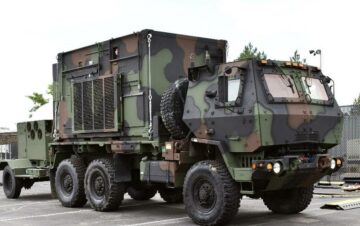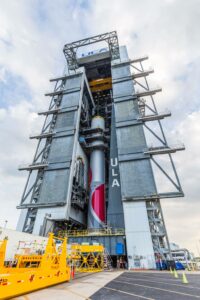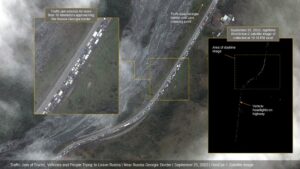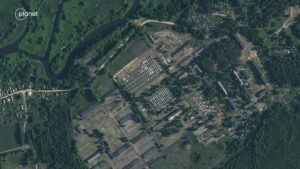
ORLANDO, Fla. — The Space Force expects to begin identifying members for its Commercial Augmentation Space Reserve — an effort to scale up its use of commercial capabilities during a conflict — and get them under contract by 2025, if not sooner.
Air Force Secretary Frank Kendall, who provides civilian oversight for the service, approved the Commercial Space Office’s plan for the construct, known as CASR, last fall. Since then, the office has worked on an implementation strategy, which includes writing contractual language for companies that will participate in the reserve.
Col. Richard Kniseley, who leads the service’s Commercial Space Office, said he plans to meet with industry a few times this year as that language gets finalized. He told C4ISRNET in a Jan. 30 interview at the Space Mobility Conference in Orlando, Florida, that the service may be ready to onboard firms to CASR as soon as this year, but it’s more likely to happen in 2025.
“We will still have a couple more industry offerings to that I can be completely transparent with them before they start seeing this in contracts going forward,” he said. “I almost want to get a litmus test from them and make sure that I’m going down the right path.”
The Space Force’s acquisition arm, Space Systems Command, announced last year it was making plans to create a commercial space reserve. The team met with industry in February 2023 and formed a task force soon after to work through legal, policy, contracting and programmatic concerns.
The resulting strategy factors in those concerns as well as feedback from more than 60 companies to ensure that both the government and industry understand the requirements and risks associated with leaning more heavily on commercial systems during conflict.
While establishing contractual language is just one piece of the service’s implementation plan for CASR, it’s an important one, Kniseley said. Speaking during a panel discussion at the conference, he said contracts are key to ensuring the capabilities these companies will be providing will remain available when they’re needed most.
“It’s how you write the contract,” he said. “It’s the terms and conditions. And that level sets the expectations for the contractor of the services that they will provide.”
Concerns about the reliability of commercial systems during wartime were illuminated last September when SpaceX founder Elon Musk revealed he had opted not to activate his company’s Starlink communication satellites in certain regions of Ukraine due to fears an attack would escalate the war. The company provided Starlink terminals to Ukraine in the early days of the conflict.
Kniseley alluded to this scenario, without mentioning SpaceX by name, saying that had the company been under contract when it happened, the outcome may have been different.
“What happened is all the more reason why have to get these on contract right now,” he said.
The Commercial Space Office is also crafting a surveillance plan for CASR members to help ensure that a company is reliable and investing in things like cybersecurity and manufacturing capabilities, Kniseley told C4ISRNET.
“Once we get you to that membership, we need to make sure you’re ready for what that potential bad day might be,” he said.
Beyond contractual details and reliability metrics, Kniseley’s team is working with the Office of the Secretary of Defense and the White House’s National Space Council to develop a construct for sharing relevant threat information with CASR members.
The Space Force recently signed an agreement with the Space Information Sharing and Analysis Center — a Colorado-based organization created in 2019 to disseminate information about in-orbit threats — to learn more about its threat-sharing approach and potentially use it as a model, he said.
Kniseley also hopes to begin collaborating with the Space Force’s Tactically Responsive Space team to test out CASR concepts as part of their capability exercises. That collaboration could help inform and validate a concept of operations for the commercial reserve, which his office is developing with U.S. Space Command.
Once that concept of operations is in place, Kniseley said, the next focus will be to secure funding for CASR. The Space Force’s fiscal 2024 budget request proposed creating a funding line for commercial capabilities, including CASR.
The fate of that proposal, at least in the near term, will lie in the FY24 defense appropriations bill, which Congress has yet to pass.
Courtney Albon is C4ISRNET’s space and emerging technology reporter. She has covered the U.S. military since 2012, with a focus on the Air Force and Space Force. She has reported on some of the Defense Department’s most significant acquisition, budget and policy challenges.
- SEO Powered Content & PR Distribution. Get Amplified Today.
- PlatoData.Network Vertical Generative Ai. Empower Yourself. Access Here.
- PlatoAiStream. Web3 Intelligence. Knowledge Amplified. Access Here.
- PlatoESG. Carbon, CleanTech, Energy, Environment, Solar, Waste Management. Access Here.
- PlatoHealth. Biotech and Clinical Trials Intelligence. Access Here.
- Source: https://www.defensenews.com/battlefield-tech/space/2024/02/02/space-force-to-put-firms-under-contract-for-commercial-reserve-by-2025/
- :has
- :is
- :not
- $UP
- 10
- 2012
- 2019
- 2023
- 2024
- 2025
- 30
- 60
- 70
- a
- About
- acquisition
- activate
- After
- Agreement
- AIR
- Air Force
- All
- almost
- also
- an
- analysis
- and
- announced
- approach
- appropriations
- approved
- ARE
- ARM
- AS
- associated
- At
- attack
- available
- Bad
- BE
- been
- before
- begin
- Bill
- both
- budget
- but
- by
- CAN
- capabilities
- capability
- Center
- certain
- challenges
- collaborating
- collaboration
- commercial
- Communication
- Companies
- company
- Company’s
- completely
- completely transparent
- concept
- concepts
- Concerns
- conditions
- Conference
- conflict
- Congress
- construct
- contract
- contracting
- Contractor
- contracts
- contractual
- could
- Council
- Couple
- covered
- create
- created
- Creating
- Cybersecurity
- day
- Days
- Defense
- details
- develop
- developing
- different
- discussion
- down
- due
- during
- Early
- effort
- Elon
- Elon Musk
- emerging
- Emerging Technology
- ensure
- ensuring
- escalate
- establishing
- expectations
- expects
- fate
- fears
- February
- feedback
- few
- finalized
- firms
- Fiscal
- fla
- florida
- Focus
- For
- Force
- formed
- Forward
- founder
- frank
- Frank Kendall
- from
- funding
- get
- gets
- going
- Government
- had
- happen
- happened
- Have
- he
- heavily
- help
- his
- hopes
- How
- HTTPS
- i
- identifying
- if
- images
- implementation
- important
- in
- includes
- Including
- industry
- inform
- information
- Interview
- investing
- IT
- ITS
- Jan
- jpg
- just
- just one
- Kendall
- Key
- known
- language
- Last
- Last Year
- Leads
- LEARN
- least
- Level
- lie
- like
- likely
- Line
- make
- manufacturing
- May..
- Meet
- Members
- membership
- mentioning
- met
- Metrics
- might
- Military
- mobility
- model
- more
- most
- Musk
- name
- National
- Near
- Need
- needed
- next
- now
- of
- Offerings
- Office
- on
- Onboard
- ONE
- Operations
- organization
- Orlando
- out
- Outcome
- Oversight
- panel
- panel discussion
- part
- participate
- pass
- path
- piece
- Place
- plan
- plans
- plato
- Plato Data Intelligence
- PlatoData
- policy
- potential
- potentially
- programmatic
- proposal
- proposed
- provide
- provided
- provides
- providing
- put
- ready
- reason
- recently
- regions
- relevant
- reliability
- reliable
- remain
- Reported
- reporter
- request
- Requirements
- Reserve
- responsive
- resulting
- Richard
- right
- risks
- s
- Said
- satellites
- saying
- Scale
- scenario
- secretary
- secure
- seeing
- September
- service
- Services
- Sets
- sharing
- she
- signed
- significant
- since
- some
- Soon
- Space
- Space Force
- SpaceX
- speaking
- starlink
- start
- Still
- Strategy
- sure
- surveillance
- Systems
- Task
- task force
- team
- Technology
- term
- terminals
- terms
- terms and conditions
- test
- than
- that
- The
- their
- Them
- then
- These
- they
- things
- this
- this year
- those
- threat
- threats
- Through
- times
- to
- told
- transparent
- u.s.
- Ukraine
- under
- understand
- use
- VALIDATE
- want
- war
- was
- we
- WELL
- were
- What
- when
- which
- white
- WHO
- why
- will
- with
- without
- Work
- worked
- working
- would
- write
- writing
- year
- yet
- you
- zephyrnet












